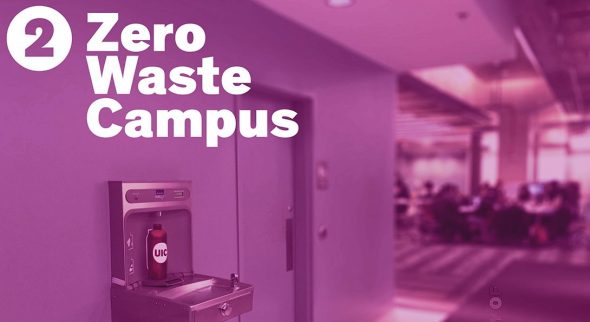UIC releases Sustainable Materials Management Plan

UIC has released its Sustainable Materials Management Plan, which addresses actions the university will take to become a Zero Waste Campus. The plan was developed by the Office of Planning, Sustainability and Project Management (PSPM) in partnership with the Illinois Sustainable Technology Center (ISTC) and with input from UIC staff, faculty and students, external partners, and other waste management experts. The plan identifies nearly 100 strategies for waste reduction and diversion that can be implemented to achieve the 90% diversion rate of landfill-bound material required for Zero Waste status, which the university hopes to reach by 2050.
“The plan is extremely comprehensive and is different from previous plans because it is based on a systemwide waste audit of 15 campus areas,” said study team member and UIC Recycling Coordinator Joe Iosbaker. “The audit conducted by ISTC involved many months of work during the last academic year and provided the data needed to fully understand how the university currently generates and manages its waste.”
UIC has tracked waste generation at various levels for more than 30 years and has collected data at both the campus and building levels. The audit team used this historical data to identify both large generation sources and opportunities for waste diversion.
During the November 2019 audit, more than 3,800 pounds of trash and recycling streams from 14 buildings and outdoor collection bins was characterized and sorted into 32 categories of waste material. The locations were separated into eight activity zones that included administrative offices, academic settings and labs, dining and residence halls, event spaces, and multi-use spaces. Outdoor landfill and recycling collection bins were classified as On the Go locations. The hospital was not included in the audit.
The collected waste was then sorted in the UIC Transportation parking lot and weighed and recorded by study team members with the assistance of UIC student, staff, and faculty volunteers.
The audit found that compostable matter makes up more than a third of the waste produced at UIC, and food scraps are half of that. Recyclable materials like paper and plastic make up another 19%. Avoidable materials like paper towels and recyclable beverage cups account for another 18% of the university’s waste, with potentially recyclable materials making up another five percent.
The remaining 24% of the waste stream consists of materials for which recovery markets do not yet exist or for which solutions are not available to UIC. This includes single-use equipment and non-recyclable paper, glass, and plastic.
According to Iosbaker, the waste characterization data provides an important foundation for the university’s efforts to achieve zero waste status.
“The data identified in the waste audit has helped to identify the most impactful actions we need to take in terms of waste reduction, outreach, and education,” he said. He added that because of the high percentage of food scraps in the waste stream, the audit also lays the groundwork for campuswide compost collection, which is currently only being done at the hospital and the two student centers.
The waste study also gathered input from campus stakeholders to ensure their viewpoints were considered and informed strategies to be identified in the final plan. Through an online survey and a series of focus groups, 55 individuals representing faculty, staff and students were able to give feedback about current efforts and identify future priorities and areas of interest.
“We’ve learned that university units really need to take control of their own generated waste if we are going to reach our Zero Waste Goal,” Iosbaker said. “We will continue to work with the hospital green team and establish new green teams at the unit level to make that happen, along with identifying new sustainable purchasing and reuse opportunities and working to expand beyond our current 47% recycling rate.”
After the collected data was analyzed, the study team compiled an extensive list of strategies designed to exceed the university’s near-term goal of 50% waste diversion by 2030 and put it on course for achieving Zero Waste Campus status by 2050. Each strategy is characterized by its potential level of impact and the activity zone to which it applies. Implementation of the strategies will be led by localized teams, PSPM, and the Chancellor’s Committee on Sustainability and Energy (CCSE) Sustainable Materials Committee.
“This study has provided the data and next steps for robust strategies for reaching our Zero Waste Goal within the UIC Climate Commitments,” said Cindy Klein-Banai, Assistant Vice Chancellor and Director of Sustainability. “It also identifies the need for broad, shared responsibility among all university units and departments. As we move forward, we hope that we can count on the support of the entire UIC community to help us reach our goal.”
For more information about UIC’s sustainability programs, visit the Sustainability website.
